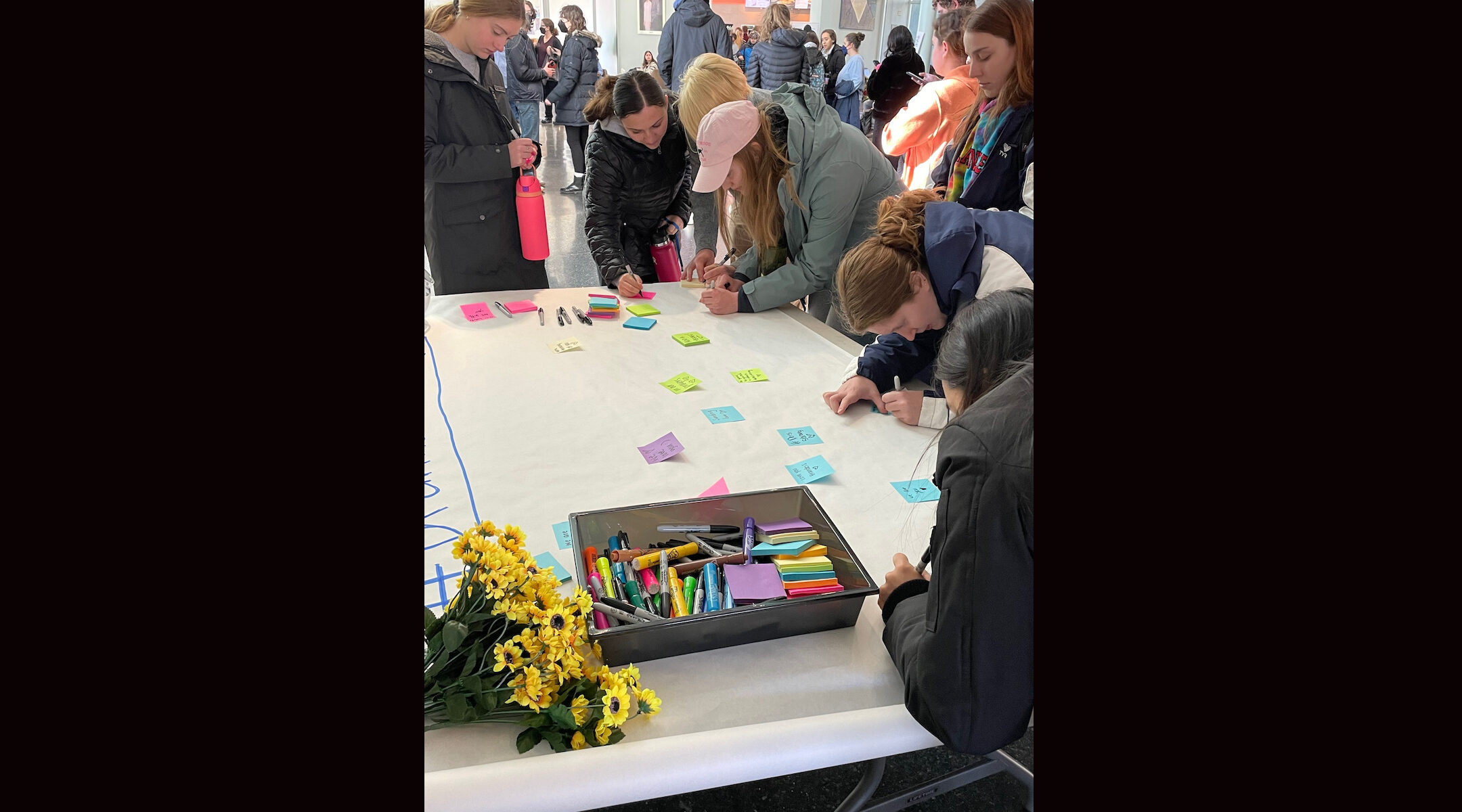WALTHAM, Massachusetts (JTA) — The days before Thanksgiving break were supposed to be packed at Brandeis University’s Hillel: There was a talk on Sunday about sexuality in Judaism, a ceremony for students who participated in a study program and a forum for candidates running to help lead the campus Jewish center.
Instead, Hillel canceled everything and instead threw open its doors for students and faculty in need of comfort and support after one of their classmates was killed and dozens more injured in an accident involving a shuttle bus many of them take regularly.
The crash occurred at 10:45 p.m. Saturday only a half mile from campus, sending shockwaves through the Brandeis community.
Rabbi Seth Winberg, the executive director of the school’s Hillel and the university’s senior chaplain, said scores of students have reached out to his organization since the deadly accident, unsettled after learning about it from communications from the college and in text messages from friends. He said he has also heard from parents and alumni, from as far away as Israel.
“We are trying to help students process and grieve,” Winberg told the Jewish Telegraphic Agency.
That was the theme on campus Sunday, as details emerged about the crash and its aftermath. The bus, operated by a contractor who provides transportation services to Brandeis, was returning students to campus from a hockey game at Northeastern University, according to the local district attorney’s office, which is investigating the accident.
Images and video posted to social media showed that the bus was heavily damaged, its front end virtually disintegrated, its roof shredded after a rollover and all windows broken. Debris was still piled at the South Street crash site Sunday afternoon.
One student died at the scene. Vanessa Mark was “an active and cherished member of the Brandeis community” who was on leave but living in Waltham, according to an announcement by the school’s president, Ron Liebowitz, on Sunday.
By early Sunday afternoon, five of the 26 people who had been hospitalized immediately following the crash remained in the hospital, Julie Jette, Brandeis’s assistant vice president for communications wrote in an email. Jette cautioned that the information was fluid because of the severity of the crash and the complexity of the situation.
“Given the number of injured people and the different hospitals to which they were transported, it is taking time to determine the status of everyone involved,” she said.
Liebowitz announced in a message to the community Sunday that classes would be canceled on Monday and Tuesday and counseling services would be made widely available.
“This will enable some students to return to family and friends sooner than the normal holiday schedule would have allowed,” he wrote. “For students who will remain on campus, we will have additional opportunities to gather and receive support.”
Liebowitz outlined the resources available to students at a community meeting Sunday morning, where hundreds of students crowded into the campus center for a community-wide gathering about the accident, Winberg told JTA.
Students remained after the gathering for up to an hour, according to Samantha Brody, a junior from Deerfield, Illinois, who is the president of Hillel’s student board.
Students “want to reach out and see each other,” Brody said. “There were lots of hugs.”
She added that both conversation and quiet contemplation were called for: “Everyone needs something different.”
Brandeis, a nonsectarian college, has its roots in the American Jewish community, which founded the liberal arts institution in 1948 at a time when Jews were often restricted in student admissions and in faculty appointments to competitive colleges. Today, just over a third of undergraduates self-identify as Jewish, according to various published reports.
Students active in Hillel and its leaders quickly came together to organize gatherings to offer support. The Brandeis Orthodox student group scheduled an afternoon prayer service, while the Brandeis Reform Chavurah and Masorti (Conservative) student groups jointly organized a service of their own. On Sunday evening, the community planned to come together to sing niggunim, or wordless melodies, as a quiet way to offer comfort.
“These are examples that show how everyone wants to be together, in person,” Brody told JTA.
Brody said on Sunday afternoon that she did not know anyone who was on the bus but knows people whose friends were. She said she has taken the shuttle bus before.
“Most people on campus have. It’s the easiest way to get to Boston. Everyone is thinking, ‘it could have been me,’” she added.
That was true for Draken Garfinkel, a Jewish senior from the Washington, D.C., area who was not on the bus. “I use it every week to see my brother,” a student at another college in Boston, he said.
When he learned about the crash early Sunday morning, from the university’s communication and from text messages from friends, Garfinkel immediately wanted to do something to help others — especially those on the bus who were hospitalized, he told JTA in a phone conversation.
One of those students is a friend, a foreign exchange student, he said.
He and others who are part of an activist student group helped organize sending text messages to students they knew were in the hospital as a way to express concern for their well being.
It’s important for all students to be aware of counseling services that are available, he emphasized, adding, “One of the worst things is when people don’t know don’t how to deal with grief.”
JTA has documented Jewish history in real-time for over a century. Keep our journalism strong by joining us in supporting independent, award-winning reporting.






